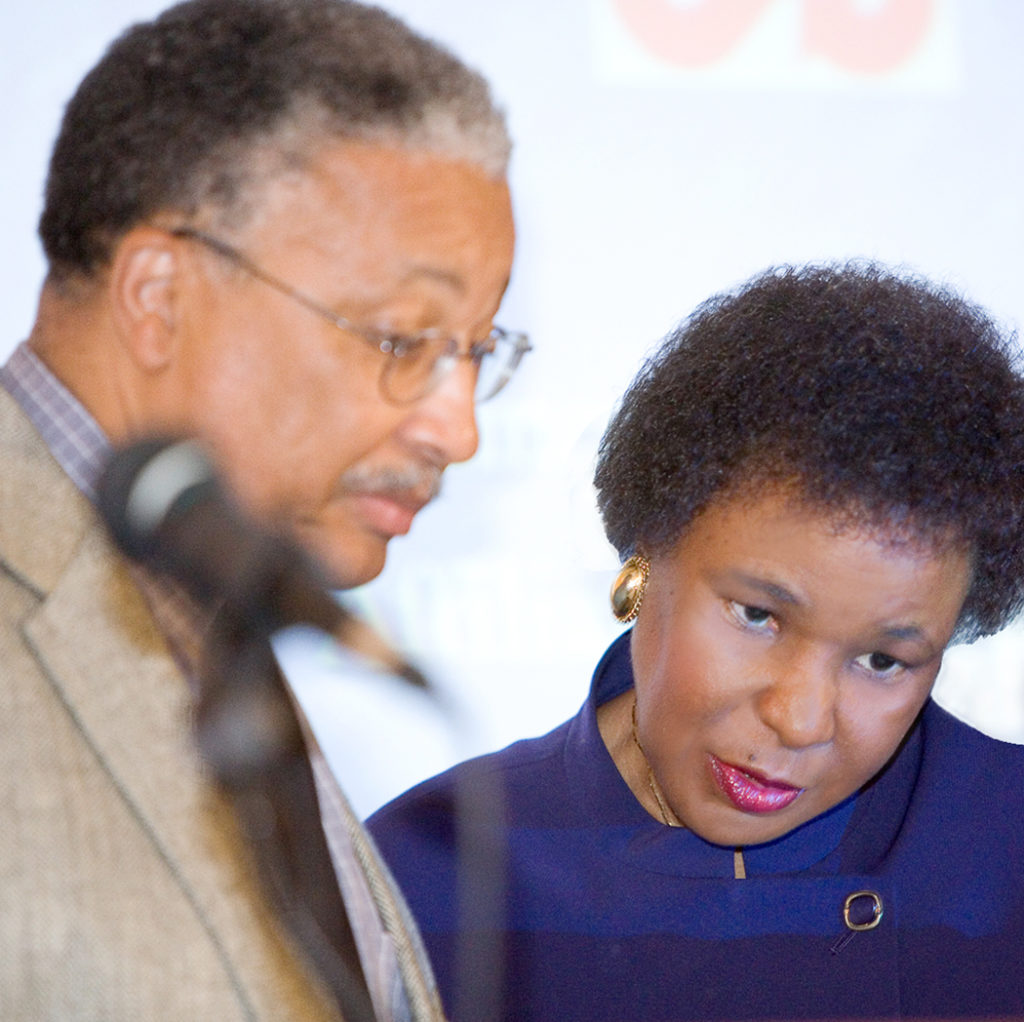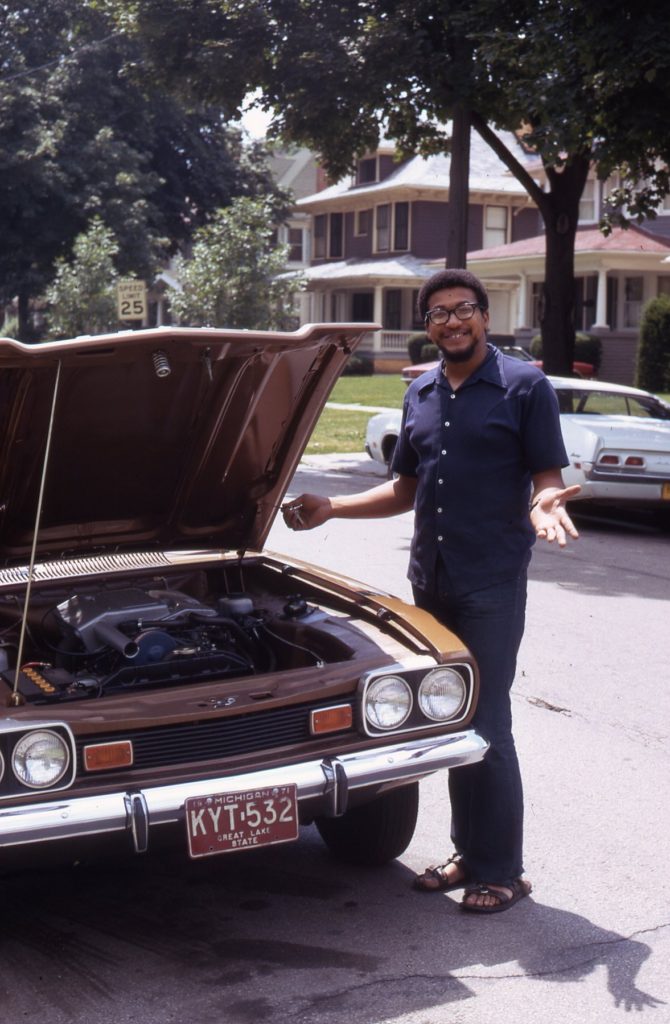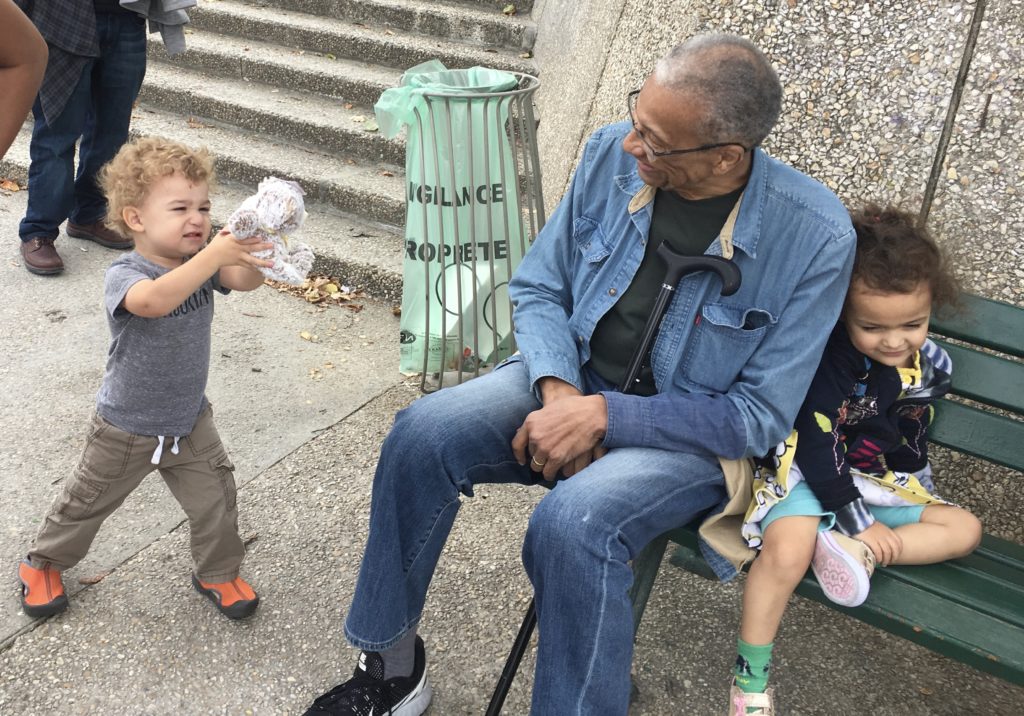Featured
Remembering James S. Jackson (1944–2020)

Photo Above: APS Fellows James S. Jackson and Toni C. Antonucci (University of Michigan), who were married for more than 40 years, visiting Montreal in the early 1970s. Photos courtesy of Mary and Jerry Levitt, who met Jackson when all were graduate students at the University of Toledo.
APS James McKeen Cattell Fellow James S. Jackson, a pioneering social psychologist known for his research on race and ethnicity, racism, and health and aging among African Americans, died on September 1, 2020, following a nearly 50-year career at the University of Michigan. The following tributes are personal recollections by some of the colleagues who knew him best.
Cleopatra Howard Caldwell • Phillip J. Bowman • Linda Chatters • Anderson Franklin • Patricia Gurin • Wayne R. McCullough • Harold Neighbors • Eleanor Seaton • Robert Sellers • M. Belinda Tucker
Introduction by Cleopatra Howard Caldwell (University of Michigan)
James S. Jackson’s career and legacy reflect his unwavering commitment and extensive contributions to the field of psychology and the social sciences through his unmatched research creativity and unparalleled mentoring of multiple generations of ethnically diverse scholars in the field.
James established the Program for Research on Black Americans (PRBA) at the Institute for Social Research, where his groundbreaking scholarship on the life experiences of ethnically diverse Black populations across the life course resulted in some of the most extensive social, political, and economic studies on the meaning of racial and ethnic influences on health and mental health. His research highlights social and biological factors in health, race and racism, and sources of psychiatric misdiagnosis specifically among African Americans. A hallmark of James’s research is the influence of racial discrimination on outcomes among African Americans and ethnically diverse Black populations. This approach highlights the significance of examining within-group differences as relevant to understanding the health and well-being of Black populations, which transformed scholarship on the mental health of African Americans in this country.
As a doctoral student in social psychology at Michigan during the early 1980s, I had the privilege of working with James, who actively engaged African American graduate students from diverse academic fields (e.g., psychology, sociology, social work, political science, public health, and economics), ethnically diverse young faculty, and a diverse and talented research staff. Most of the faculty and students involved with PRBA have gone on to produce cutting-edge research and become distinguished scholars in their own right. This level of success is a byproduct of the quality of research mentorship James provided. James encouraged others to achieve despite facing challenges. He was the ultimate optimistand the biggest cheerleader for all of his mentees. He did not allow failure to be an option. He was always there with an encouraging word and an alternative way to interpret a challenging proposal or manuscript reviews with humor and expert guidance. He had faith in his mentees’ ability to achieve long before we did, and he expected only the best. His generosity in allowing me to oversee the adolescent component of the National Survey of American life study and to participate in professional meetings with and for him launched my own academic career. The learning environment and opportunities for professional growth and discovery that James provided at PRBA are exemplified among his mentees around the world. Without James’s extraordinary vision, strong leadership, and innovative scholarship, there would be no network of outstanding scholars, especially African American scholars, contributing to expanding the knowledge base of Life in Black America in the field of psychology and beyond.
I am fortunate to have been a student, mentee, colleague, and friend of James throughout my career. James S. Jackson’s remarkable influence on so many will be missed.

Phillip J. Bowman (University of Michigan)
James S. Jackson was a brilliant scholar, but also a bold trailblazer, charismatic leader, optimistic visionary, generative mentor, and compassionate friend. As an internationally renowned social psychologist, James was a trailblazer from his humble beginnings in Inkster, Michigan, a segregated Detroit-area community for Black workers adjacent to Henry Ford’s Dearborn factories. For almost 50 years, it has been a career-defining honor for me to work closely with James as a graduate student, colleague, research collaborator, and friend.
As a University of Michigan graduate student, I first met James in 1971 when he arrived as a new assistant professor shortly after completing his PhD. A product of 1960s activism, James blazed a trail of leadership inspired by both Martin Luther King and Malcolm X, with a strong commitment to racial desegregation, integration, and Black power. As a personification of these core values, James leaves a brilliant legacy with PRBA, cutting-edge scholarship on the affordances model of mental and physical health disparities, transformative leadership contributions to several national and international organizations, and multiple generations of “mentees” who continue to exemplify his commitment to address racial-ethnic disparities and improve the lives of African Americans and others. At a personal level, James and I shared a strong commitment to the well-being of the next generation. I miss his infectious optimism as a compassionate friend who was more like extended family and a brother who was always warm, generous, and caring.
Linda Chatters (University of Michigan)
James S. Jackson’s legacy is unparalleled with respect to the enormous impact that he had in illuminating Black life in America through the landmark national studies that he directed as founder and director of PRBA. The National Survey of Black Americans and the National Survey of American Life datasets have together generated roughly 800 articles and 100 dissertations.
James was directly instrumental in changing institutional structures associated with social science research and training. Since its founding, PRBA has trained several hundred PhD students and postdoctoral scholars from diverse academic disciplines and practice fields who now hold positions in universities across the nation. PRBA mentoring and training activities reflected James’s personality, energy, and curiosity and his guiding beliefs that the study of Black American life, in all its diversity, is of the utmost importance and should be conducted with scientific rigor and precision.
Finally, as a first-generation college student, James’s personal life history resonated with many of us. He was acutely aware of the personal challenges we faced in negotiating academic settings that were unfamiliar and oftentimes unwelcoming of our presence. James listened, understood, and role-modeled the skills and confidence to overcome these challenges.
For many of us who had the honor of knowing and learning from James, his legacy to us and our obligation to his memory is to “pay it forward” and continue to contribute to scientific inquiry and service in our respective fields of endeavor.

Anderson Franklin (Boston College)
James Jackson was a visionary who converted a vision into reality. James was a colleague, friend, and “family member” for over 50 years. We started our careers, and life journey together from about 1970. My insights into James’s career are based on witnessing his professional and personal development from years of intimate conversations with him about our aspirations over innumerable discussions and many other private moments together across the globe. Our professional collaborations were only a part of our life tapestry.
It was in the early 1970s at one of our private meals that James shared his grand vision to build a program with a team of interdisciplinary scholars in collaborative research to study the much broader and diverse lived experiences of African Americans rarely genuinely studied, much less represented in the literature. His establishment of PRBA, as an early-career professional, turned into the progenitor of many related national and global funded initiatives and launched the careers of generations of Black psychologists and other scholars for over 40 years. He was optimistic and positive in outlook, and he believed more in what can, rather than what cannot, be done.
James was generous with his time, which he so freely gave to students. He was a master mentor. He made so many believe in their talent and their potential to do more than they believed possible. This was a particular part of his commitment to African American students that he envisioned as the next generation of Black scholars and researchers. He was also inclusive of many others, their points of view and diverse scholarship, and embraced collaboration. These personal and professional attributes are the foundation upon which James built his own scholarship and a career that included becoming the first African American director of the Institute for Social Research at the University of Michigan. James was a frequently sought out expert and resource on African American life, as well as promoter of social justice and equity, with appointments on distinguished boards and committees. His “firsts” are many throughout his career. His professional accomplishments are emblematic of a set of unique personal and professional attributes.
Therefore, in addition to all of the deserved accolades for James Jackson, which are many and catalogued in our memorials and our scholarly archives, the one I most want elevated for students and early career professionals to emulate is his model of how a visionary dreams, implements their vision, and brings it to fruition.
Patricia Gurin (University of Michigan)
James Jackson already had a vision for the first national study of Black Americans when he joined the faculty at the University of Michigan in 1972. He wanted a large sample of Black Americans to study how mental health was conceived and experienced differently among different groups of the Black population, as well as conceived and experienced as a Black cultural phenomenon—not something compared to Whites. Thus, the first national study of Black Americans was launched, followed by the subsequent ongoing studies that over many years have provided a treasure trove of data and narratives about Black Americans in the United States. He kept PRBA funded and productive for 45 years.
From the beginning, James mentored graduate students, postdocs, and junior faculty members, and he provided a model for other senior social scientists to do that as well. His legacy is thus not only the rich depictions of Black Americans through his scholarship based in the series of studies he conceived and funded, but also the huge number of Black and other social scientists of color he mentored who now lead programs, departments, universities, government agencies, and international institutions across the country and abroad.
His colleagues and friends feel sad beyond words to have lost James when he was still young and vibrant—still writing proposals well after his cancer diagnosis, still supporting young Black social scientists. He stands for the best in social science and humankind.

Wayne R. McCullough (Michigan State University)
I first met James S. Jackson as he was starting his third year at the University of Michigan. He, a young assistant professor, and I, a new graduate student, became acquainted but navigated separate paths until 1977, when I had the privilege of working with him on the National Survey of Black Americans (NSBA).
James was energetic, a bold leader with expansive vision and a sense of humor. I often referred to him as Dr. James S. Kirk Jackson. A famous quote from James Kirk, the Enterprise captain, was “To boldly go where no man has gone before.” While I never heard James express this as his personal mission statement, his career and personal achievements solidly exemplified it.
NSBA is a prime example of one of James’s successful and groundbreaking explorations into the unknown. NSBA employed nontraditional approaches and survey methods to obtain a deeper understanding of the political, economic, spiritual, health, and generational issues confronting the Black population. As a leader, James set the direction, built a vision, fearlessly sought funding, and coalesced people, especially graduate students and postdocs, with the right skills to get the work done. NSBA’s seminal work set the stage for numerous streams of research and follow-on studies, which to this day remain significant and influential to advocacy groups and policymakers.
This early work led, perhaps, to one of James’s greatest lifetime achievements: the creation of a network of scholars devoted to research, interventions, and policy issues affecting communities of color. At the time, the typical professor worked with a few graduate students, crafting them into their own image. James, in contrast, surrounded himself with skilled, questioning students and scholars from a range of disciplines. Today, such approaches are in vogue, but not then. A great leader and mentor, James not only guided and inspired students but also found ways to obtain financial support for them. His efforts have not only dramatically advanced research and scholarship but have also led to a legion of networked scholars throughout the United States and abroad.
Throughout his stellar career, James shared his vision and provided leadership to many departments and centers within the University of Michigan and prominent professional groups. He also served on many review boards and panels. In 2005, he was appointed director of the Institute for Social Research. At ISR, he was instrumental in helping to drive incremental and infrastructure funding for social science research, which enabled the building of a fourth wing on ISR, a first in the nation for a non-biomedical science institute.
A “Trekkie” at heart, James attempted and achieved so much because he often went where no man had gone before with the firm belief that he could achieve his lofty goals. He lives on in the lives he so immeasurably touched.
Harold Neighbors (National Institute on Minority Health and Health Disparities)
In 1975 I moved to Ann Arbor to pursue a PhD in social psychology at the University of Michigan. I had the good fortune of being assigned to an energetic and eternally optimistic assistant professor, James S. Jackson. I had no idea that this lucky pairing would mark the beginning of a research career that would take me into almost every area of minority health one could think of. As my advisor, and eventually my mentor, James introduced me to many people and to many topics that I would go on to study for the next 45 years. It is difficult to express the depth of feeling for someone who opened so many doors. I was honored to have a “front row seat” as I watched James execute many bold and brave moves that turned his dreams into a reality of accomplishments that few Black graduate students thought possible. James possessed a boundless energy that appeared to have no room for the word “fatigue.”
I will be forever indebted to James for the strong support he gave to me over several decades. He was instrumental in assuring that there was never a time in my graduate student career that I did not have some source of financial support. As director of PRBA, he provided me with a sense of belonging I did not know was possible. As principal investigator (PI) on the National Survey of Black Americans, James provided a unique opportunity to gain quality, “hands-on” survey research experience. James was the source of the constructive criticism necessary for me to formulate my own ideas on Black mental health. James was, and still is, a mentor and a friend. This is how I remember James Jackson.

Eleanor Seaton (Arizona State University)
The first time that James Jackson and I met is indicative of who he was as a scholar, mentor, and person. I was an undergraduate psychology major at the University of Illinois at Urbana-Champaign, and I enrolled in a course with James Anderson. James recommended that I speak with his friend (i.e., James Jackson) about earning a PhD in psychology. Since this incident predated cell phones and the Internet, James Jackson and I played telephone tag but never communicated.
I read the book Family Life in Black America, by Robert Taylor, James Jackson, and Linda Chatters while in graduate school. It dawned on me that James Jackson was the person I had attempted to connect with as an undergraduate student. I was shocked to learn that despite James’s many accomplishments, he found time to connect with an undergraduate student who wasn’t sold on attending graduate school. When I arrived at the University of Michigan for my postdoctoral fellowship in PRBA, I told James this story. He responded with a big smile and stated “That sounds like something I would do. I’m glad you’re here now!”
I am forever grateful for James Jackson’s mentoring because his influence can be observed in the specific theories and methodological techniques that I utilize and the research questions that I pursue. Yet, two aspects of his mentoring stand out. The first includes acknowledgment of the variation within the Black community. The second includes an unapologetic embrace of studying Black youth without a White comparison group.
Robert Sellers (University of Michigan)
James S. Jackson had one of the most distinguished careers of any social psychologist of his generation. James received just about every honor that any social psychologist could hope to receive across numerous fields. However, in my opinion, James has always been under-appreciated within the field of mainstream social psychology. Despite his prolific, rigorous, and impactful scholarship, he never had a particular effect or theory named after him. Instead, James’s scientific contributions were more ecumenical. They could never be contained within a single field such as psychology, let alone an area of psychology. James always had a much broader vision of the world and the role of his scholarship in it. He was a throwback to an earlier time when psychologists, sociologists, political scientists, and economists all interacted with each other, and drew on each other’s theories, concepts, and perspectives—all in the service of addressing real world issues and societal problems. He was a true Renaissance man with a voracious curiosity for so many subjects. As a result, James’s contributions spanned many fields and disciplines. And, also as a result, James knew everybody and everybody knew James. He had more faculty and leadership appointments at the University of Michigan over his nearly 50-year tenure than the number of appointments most people have in a month on their Google calendars.
James’s greatest scholarly contribution came via his work as founding director of PRBA. Through PRBA, James and his colleagues developed and implemented several field changing national surveys (including NSBA, NSAL, Black Election Study) on the experiences of Blacks in America. This work helped to usher in a sea change in the way that we study African Americans. Previously, the overwhelming majority of social science research on African Americans took a comparative approach in which African Americans’ experiences were studied in comparison with Whites. These comparisons always assumed that African Americans were deviant in some way, either because African Americans were somehow inherently deficient or because they deviated from the “White control” or normative group due to their long-suffering as objects of oppression. And as such, African Americans were viewed as only worthy of study in the context of their “deviance from Whites.” James and his colleagues were among the few and most influential to make the case that African Americans’ life experiences were worthy of study in and of themselves. James’s work unapologetically centered the wide-range of social, interpersonal, intrapersonal, and psychological experiences of African Americans; and in doing so, he and his colleagues forced the scholarly field to recognize the humanity of African Americans. This approach to studying within-group variation in African Americans is foundational to the ongoing movement across all of the social science related fields and professions to de-center the experiences of predominately White men as the de facto norm from which all other groups are to be measured against. James helped pave the way for much of the current scholarship that is centering the experiences of other traditionally underrepresented or marginalized groups; and thus, providing us with both a more authentic picture of the lived experiences of these groups as well as a fuller understanding of the breadth of the human experience.
If James’s scholarship at PRBA had been the full extent of his contributions to the field, he would have been substantial and worthy of admiration. However, in my mind, his greatest contributions were in the thousands of social scientists of color that he mentored, sponsored, and supported throughout his career. It did not matter what one’s interests were, or what institution one was at, James and PRBA were always willing to support any scholar interested in learning more or doing more.
I witnessed that firsthand when I came to Michigan in the Personality doctoral program from Howard University in 1985. I was told by mentors at Howard to make sure that I connected with James Jackson, even though my primary research interests (stress and coping among student-athletes) were totally unrelated to the work that James and PRBA were doing at the time. Despite his insane schedule (think of the number “Non-Stop” from the play Hamilton) and the fact that I was not even a student in his program, James found time to mentor me all the way through my graduate program. Throughout my career, he not only served as a mentor, but also as a sponsor—opening doors and providing opportunities that I never would have had without him. There is a small part of me that would like to think that I was special, an exception. In reality, I know that I was really just one of many favorites, part of an army of scholars of color, that James helped prepare to build a canon of scholarship on the life experiences of Black peoples throughout the diaspora. Forward sightedness was always his greatest gift. He envisioned an academy that few others could, and then through his sheer genius, personality, and will, he made it happen.

M. Belinda Tucker (University of California, Los Angeles)
To my great good fortune, I entered Michigan’s social psych program at the same moment that James Jackson became the department’s first full-time African American professor. At 27 years of age, James was barely older than our newly diverse cohort of grad students. He was exuberant, ever-optimistic, confident, hyperenergetic, magnetic and bold—filling us with grand revolutionary ideas. Nearly heretical at the time, James asserted that the African American experience was worthy of study in its own right, and he devoted his life to developing new methodological and conceptual vehicles for understanding populations of color and the systemic inequities they face.
We ate this up! After all, most of us had attended college during the turbulent 1960s, when all things seemed possible and calling out injustice and prejudice was essential. James had actually spent time with Martin Luther King, Malcolm X, and even Jimmy Hoffa, and when he took on these disciplinary sacred cows, we were buoyed. I became James’s first dissertation student.
Jerry Gurin and I were privileged to be co-PIs on James’s inaugural proposal to National Institute of Mental Health for the first nationally representative mental health survey of Black Americans—his initial foray in a lifelong series of groundbreaking interdisciplinary studies that challenged established views and became training vehicles for a new workforce/brain trust that would literally change the face of racial inquiry and our institutions. Upon completing the proposal at midnight (by typewriter!), James, Jerry, and I rewarded ourselves by sharing an Apple Mountain dessert at Ann Arbor’s legendary Cottage Inn.
The vital core of this remarkable journey is James’s legendary devotion to students and younger colleagues, thereby establishing a model of mentorship that we, his academic offspring, have wholly embraced and imparted to our own progeny. James’s transcendent and transformative impact on our professions and the legion of scholars he shepherded through this life is eternal. I owe my entire career and my impossibly rich life to James.





APS regularly opens certain online articles for discussion on our website. Effective February 2021, you must be a logged-in APS member to post comments. By posting a comment, you agree to our Community Guidelines and the display of your profile information, including your name and affiliation. Any opinions, findings, conclusions, or recommendations present in article comments are those of the writers and do not necessarily reflect the views of APS or the article’s author. For more information, please see our Community Guidelines.
Please login with your APS account to comment.